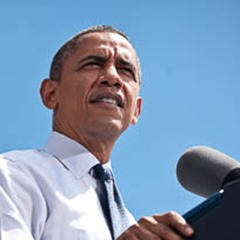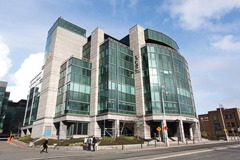The corporation tax debate
 Peter Cheney reviews Barack Obama’s comments and objectives on profit-shifting and the different responses from Ireland’s policy-makers.
Peter Cheney reviews Barack Obama’s comments and objectives on profit-shifting and the different responses from Ireland’s policy-makers.
Vocal criticism of “magically” Irish companies by Barack Obama has highlighted Ireland’s corporation tax rate for negative reasons although the main thrust of his message is to close loopholes in US law.
The President made his initial comments in a speech to students at the Los Angeles Trade-Technical College on 24 July. A small but growing number of US corporates “just don’t want to pay for” American universities and other advantages and are “technically renouncing their US citizenship” for tax purposes.
“It damages the country’s finances. It adds to the deficit. It makes it harder to invest in things like job training that help keep America growing. It sticks you with the tab to make up for what they’re stashing offshore through their evasive tax policies.”
The President added: “My attitude is I don’t care if it’s legal – it’s wrong.” While there was nothing wrong with expanding to foreign markets, he told his listeners: “Folks, if you’re a secretary or you’re a construction worker, you don’t say: ‘You know what? I feel like paying a little less so let me do that.’ You don’t get a chance to do that. These companies shouldn’t either.”
Later that day, Obama name-checked Ireland in a CNBC interview. The problem was characterised as a firm with 10,000 US employees acquiring a 100-strong workforce in Ireland and effectively saying: “We are now magically an Irish company.”
Those words fit well with his pitch to blue collar voters struggling with negative equity and low incomes. The audience lives in one of LA’s poorest neighbourhoods and the mid-terms are coming up in November.
The speech also chimes with a protectionist focus which has been part of his policy over the course of the recession, and perhaps has been under-reported here. Irish political leaders traditionally play up Irish-American links but decisions in Washington are still made with a cold eye on the USA’s best interests.
Patriotism
Corporate tax has been a long-term interest for Obama. As a Senator, he introduced the Patriot Employers Act (August 2007) to set up a tax credit for companies that maintained their headquarters in the USA. The legislation stalled in the Senate’s Finance Committee but was referenced in Obama’s ‘Blueprint for Change’ manifesto (February 2008).
The economic crisis then intervened and Gordon Brown pressed Obama and other world leaders for a clampdown on profit-shifting. At the London G20 summit (April 2009), they agreed to “take action against non-cooperative jurisdictions, including tax havens” with “sanctions to protect our public finances and financial systems.”
Ireland successfully defended its corporation tax rate against European pressure in the following years. US diplomats in Dublin noted that this was a live issue in the Lisbon Treaty debates.
Interestingly, the new emphasis on tax follows on from a statement at the Lough Erne G8 summit declaration (June 2013). Tax authorities should automatically share information to “fight the scourge” of tax evasion, countries should change rules that allow profit-shifting, and multi-nationals should report “what tax they pay where”.
The next major development in Washington was the President’s proposed budget (March this year) which set out his plans for the 2015 financial year.
“Tax loophole closers” were among the headline policies. A tax inversion occurs when a US company merges with a non-US company and the resulting merged holding company is incorporated outside the USA. The owners of the non-US legacy company need to own at least 20 per cent of the new company.
 Our 12.5 per cent rate stands out attractively when compared with 35 per cent corporation tax in the USA. A specially negotiated deal allows Apple to pay just 1.9 per cent on its foreign profits when registered in Ireland.
Our 12.5 per cent rate stands out attractively when compared with 35 per cent corporation tax in the USA. A specially negotiated deal allows Apple to pay just 1.9 per cent on its foreign profits when registered in Ireland.
The Government and IDA Ireland defended their approach by pointing to the 98,000 jobs created and sustained by US investors. They also acknowledge that a small number of firms bring little or no benefit to the State but little can be done as they have freedom to establish their operations here.
“The absolute agreement in the Irish business community is that the reputation of Ireland is for a low corporation tax environment, not a no-tax environment,” said Ibec CEO Danny McCoy. “The challenge now is to work with our international partners to underpin this approach and squeeze out the facilitation of no-corporate tax payments.”
Fianna Fáil finance spokesman Michael McGrath TD remarked that the President’s remarks were “simplistic in the extreme” and he was unaware of any arrangement similar to the one he described: “The business case has to stack up before any transaction of this this type would take place.”
The real cause of the problem, he added, was the USA’s own “myriad of loopholes and tax breaks” which encouraged investors to look elsewhere. Sinn Féin maintains that multi-nationals must pay exactly the same rate as indigenous companies.
Havens?
So is Ireland a tax haven? Views differ as there is no strict definition for the term and it now carries a stigma. As has been pointed out, Ireland’s status is ‘low tax’ rather than ‘no tax’. Investors can seek out zero corporation tax rates on the Isle of Man and several Caribbean islands.
Back in 2012, though, University of Limerick economist Stephen Kinsella challenged Ireland to claim the title as the State allows “large sophisticated companies to pay less tax by [funnelling] profits through financial intermediaries.” Those arrangements naturally appealed to CEOs and were in the national interest. However, he also warned: “The fact that so many US multinationals are availing of tax havens abroad is beginning to dawn on a cash-strapped US administration.”
Low tax regimes in the USA have, curiously, avoided Obama’s criticism. Almost two-thirds of the Fortune 500 companies are incorporated in Delaware, making use of its extensive tax loopholes and therefore distorting the revenues of other states. Delaware is also the home state of Obama’s Vice-President, Joe Biden.





